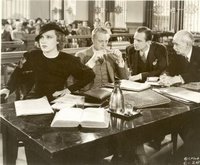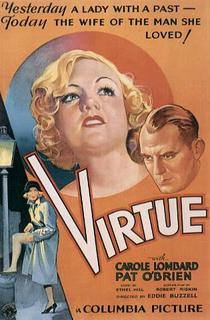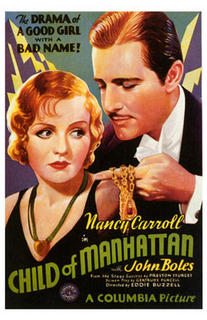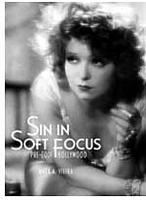 The Balboa's new schedule for the remainder of 2005 is out, and it does not disappoint. "Sin in Soft Focus" brings us 43 pre-code films from one of the most daring studios of the day, Paramount Pictures. Pre-code scholar Mark A. Viera helped put together the program, which is presented in conjunction with the San Francisco Film Society and the UCLA Film and Television Archive. Though there are some familiar titles like "Blonde Venus" and "Dr. Jekyll and Mr. Hyde," most are rarely screened movies not available on DVD and not seen on TV in years.
The Balboa's new schedule for the remainder of 2005 is out, and it does not disappoint. "Sin in Soft Focus" brings us 43 pre-code films from one of the most daring studios of the day, Paramount Pictures. Pre-code scholar Mark A. Viera helped put together the program, which is presented in conjunction with the San Francisco Film Society and the UCLA Film and Television Archive. Though there are some familiar titles like "Blonde Venus" and "Dr. Jekyll and Mr. Hyde," most are rarely screened movies not available on DVD and not seen on TV in years.
Here's just a few of the highlights of the program, running November 3 through the 24th:
Friday, 11/4: Viera introduces Mitchell Leisen's "Murder at the Vanities" (with young ingenue Kitty Carlisle) and the 1934 drama "Bolero" featuring tough guy George Raft as a dancer. At 11PM (separate admission), early talkie favorite Miriam Hopkins stars in the infamous "The Story of Temple Drake" , presented along with some ultra-rare pre-code movie trailers.
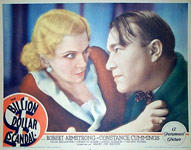 Monday, 11/7: Crime and Thriller Triple Feature: "Guilty as Hell," "Billion Dollar Scandal" and a surprise feature!
Monday, 11/7: Crime and Thriller Triple Feature: "Guilty as Hell," "Billion Dollar Scandal" and a surprise feature!
Thursday, 11/10: More rare Miriam Hopkins in 1932's "Two Kinds of Women," directed by Cecil B.'s older brother William de Mille.
Wednesday, 11/16: Check out the recently restored two-strip Technicolor golf musical "Follow Thru" with Paramount stars Buddy Rogers and Nancy Carroll. Don't miss the early feature on the double bill, "Search for Beauty," one of the last gasps of the pre-code era, starring Buster Crabbe and a very young Ida Lupino.
Thursday, 11/17: Buster's on the bill again in "King of the Jungle," playing a Tarzan type opposite Frances Dee as a city-living Jane. Paired with 1933's lurid jungle drama "White Woman."
Tuesday, 11/22: Mae West commits grand theft larceny by stealing the picture in her movie debut "Night After Night." Crime also pays for Alison Skipworth as "Madame Racketeer" in the second feature.
Obviously, there are too many great movies to mention them all. Cary Grant, Marlene Dietrich, Claudette Colbert, and The Marx Brothers are also represented in the series.
As an added bonus, some Betty Boop cartoons will round out the bill on many evenings.
Bravo, Balboa, on an ambitious and sure to be well-attended series!
